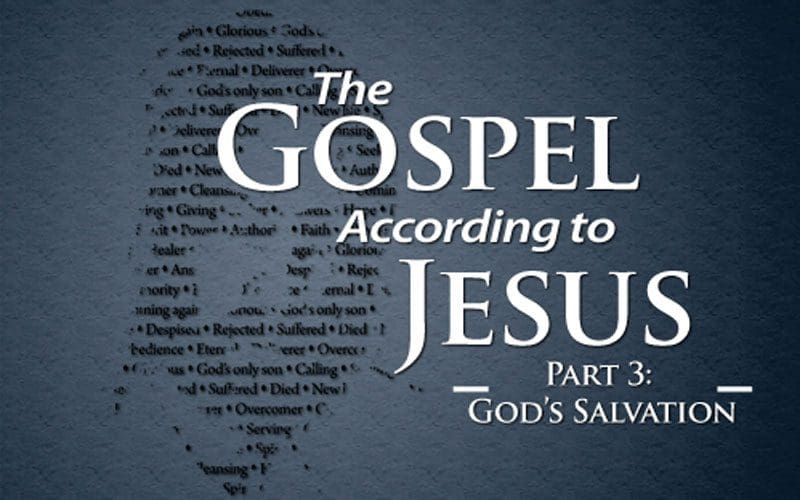’You will all fall away,’ Jesus told them, ‘for it is written: ‘I will strike the shepherd, and the sheep will be scattered.’ But after I have risen, I will go ahead of you into Galilee.’ Mark 14:27-28 (NIV)
Today we begin the story of Christ’s passion. The suffering of Christ came in three stages: First, He suffers at the hands of his friends: Judas betrays Him. Peter denies Him. All the disciples forsake Him. Then, He suffers at the hands of His enemies: They mock Him, torture Him, condemn Him and crucify Him. But the deepest level of Christ’s suffering was not at the hands of His friends or His enemies, it was what He suffered at the hand of God.
When Christ hangs on the cross, darkness comes over the whole land. He bears our sins, endures our judgment, and experiences all the dimensions of hell for us on the cross. And in the agony of this suffering, He loses even the help of God: “My God, my God, why have you forsaken me?” (Mark 15:44).
Stripping away the comforts of Jesus
We come to holy ground today, as we take this first step into the passion of Jesus Christ in Mark 14: He Suffered at the Hands of His Friends. It begins with a dinner in the home of Simon; it ends with a trial in the house of the High Priest. It begins with Jesus surrounded by the love of His friends; it ends with Jesus alone, surrounded by the hatred of His enemies. It begins with the worship of Christ; it ends with His condemnation.
This is the story of the stripping away of all the comforts and blessings of Our Lord’s life. It details the breaking up of His inner circle, and the unraveling of His years of ministry. He’s poured years into these men, and they’re all gone.
There is much for us to learn here from the experience of the disciples, but the big story here is not what happened to Peter, James, John or Judas. The big story is what happened to Jesus. Mark’s story is about the suffering of the Son of God, and the failure of His friends is the beginning of His suffering.
Striking The Shepherd
‘You will all fall away,’ Jesus told them, ‘for it is written: ‘I will strike the shepherd, and the sheep will be scattered.’’ (v27)
Mark begins by telling us about a dinner given in Jesus honor. It was held in the home of Simon, a man who had been wonderfully healed from leprosy. Jesus is “reclining at the table” (v3), while a woman (who Mark chooses not to name) expresses her love and worship to Him by taking a jar of perfume, worth “more than a year’s wages” (v5), and pouring it over His head.
Jesus says that what she has done is “beautiful” (v6). But some of the other guests in the house thought that it was “a waste” (v5). They felt something so valuable could have been put to better use.
The last goodbye
Then Judas Iscariot, one of the Twelve, went to the chief priests to betray Jesus to them. (v10)
That phrase, “one of the twelve” comes three times in this chapter. It’s never just “Judas;” it’s always “Judas, one of the twelve,” emphasizing the pain for our Lord that this betrayal came from the inside, from one of his closest followers.
- “Judas Iscariot, one of the twelve” (v10), went to the chief priests to betray Jesus.
- Jesus says it is “one of the twelve” (v20), who will betray him.
- “Judas, one of the twelve” (v43), appeared along with the crowd armed with swords and clubs.
Mark has already told us that Jesus appointed the twelve “to be with Him” (Mark 3:14). They were to be with Him. They were His friends. Christ formed deep bonds with these men. He poured his life into them. They were the ones on earth with whom He could feel at ease and share his heart.
Judas was one of the twelve. He was in Christ’s inner circle, one of His closest friends. Christ loved this man. And yet this man resisted His love. Here was a man loved by Christ, who did not belong to Him. He had been with Christ for three years. He had been trusted in leadership, and sent out in ministry, but this is a man who would be lost, forever.
As this man arrives at the Garden of Gethsemane, he goes “at once to Jesus… and kissed Him” (v45). And that kiss is the moment of final parting. Judas will no longer see His face. He will spend eternity away from Christ. Judas doesn’t know this, but Jesus does.
Who can describe the pain in the heart of Christ as He receives the kiss of a man on his way to everlasting hell? There is unique pain in this moment for Jesus. Christ knows that he will see the other disciples again. “After he has risen he will go ahead of them to Galilee” (v28). But Judas will not be there. This kiss was the last goodbye from a man Jesus loved.
Alone with His enemies
You will all fall away! (v27)
But it wasn’t just Judas. The other disciples would also have a hand in His pain. Peter could not imagine this: “Even if all fall away, I will not,” he said (v29). You have to admire the courage and determination of the man. “You can count on me—even if I am the last man standing!” I’m sure he meant it with all his heart.
But when the crowd arrived with swords and clubs, fear got the better of their faith, just as it does for us many times. Mark says “Everyone deserted Him and fled” (v50). It wasn’t that they kind of slinked away. They ran from Him!
Klaus Schilder, the Dutch writer, speaks movingly of the pain this desertion brought to Christ:
Isolation is always painful, for a human being instinctively seeks company… [Christ’s] sensitive heart craved company, yearned for understanding, for sympathy, for someone sharing his experiences, someone fully understanding His soul. But Jesus must watch them go, one by one. See, there goes Peter, and now John. James, too, is leaving. One by one they tear themselves away from Jesus’ soul.[1]
Now Christ is alone in the presence of His enemies. He is deserted by all of His trusted friends. This is the story of Mark 14.
The last man standing
Peter followed him at a distance, right into the courtyard of the high priest. There he sat with the guards and warmed himself at the fire. (v54)
Then there seems to be just a flicker of hope. One man, and only one, feels that he wants to be close to Jesus on this night. You have to love Peter’s devotion. He ran, but he couldn’t stay away from Christ. So, maybe this man will bring some comfort to Christ in His suffering.
They took Jesus into the house of the High Priest, where the chief priests, elders and teachers of the law came together. And as Peter stood outside in the courtyard, someone recognized him. One of the High Priest’s staff said to him: “You were with that Nazarene” (v67). Peter denied it, but she wouldn’t be put off. She tells some of the others standing around: “This fellow is one of them” (v69).
After a while, they take up the question with him: “those standing near said to Peter ‘surely you are one of them for you are a Galilean’” (v70). And then we hear these awful words: “He began to call down curses on himself, and he swore to them, ‘I don’t know this man you’re talking about’” (v71).
The mock trial that Christ has been subjected to ends, and He is brought from the High Priest’s house, bruised from the blows He suffered there. And Jesus is taken to a dungeon where He will spend the night before His crucifixion.
A moment of triple agony
Luke records in his gospel how God orchestrated three events to converge at the same moment in time: As Jesus is dragged across the courtyard, He hears the voice of His friend cursing, and swearing: “I don’t know this man you’re talking about” (v71). While Peter is still speaking, Luke tells us, “the rooster crowed” (22:60).
Then Luke records that at that moment, “The Lord turned and looked straight at Peter” (v61). There was great pain in that moment for Peter, but what kind of agony was there in it for Christ? That’s the last man standing! The heart of Christ is torn as this last human comfort of His life, the bravest of His friends, has been taken from Him.
Why does Christ have to be alone? Why the break-up of the inner-circle and the unraveling of His ministry? Christ bears the sins of the world alone. The disciples cannot help Him. There is no role for them to play. No one can contribute to what He is doing here. No one can say, “I had a part in this. I helped Him. I was the one who stood with Him.” Christ does not do this redeeming work with us, He does it for us! And He’s utterly alone.
The Sheep Will Be Scattered
I will strike the shepherd and the sheep will be scattered. (v27)
Let’s think about this from the angle of the sheep, for that is our own perspective. In the Garden of Gethsemane, Jesus warned the disciples about the temptation they were about to face. “Watch and pray so that you will not fall into temptation. The spirit is willing, but the flesh is weak” (v38). He’s not talking about supporting Him in His trial.
The work of bearing our sin and paying our ransom is something that Christ does for us. But this work of watching and praying is something that He calls us to do for ourselves. “Watch and pray so that you will not fall into temptation” (v38).
“Very soon, you will face a great trial. You need to be prepared. You need to be ready. That’s why we are here in this garden. And this is what you must do: Watch and pray.” But they did not watch. And they did not pray. So, when temptation came, they were overwhelmed by it. They gave into it and they fled.
I wonder if you can you see yourself here? We are the ones who have not watched, and have not prayed. We are the ones who have fallen into temptation. We are the ones who have backed away from the full cost of following Christ. We are the ones who have run from Him instead of running to Him. We are the scattered sheep, and our sins have brought His sufferings.
But After I Have Risen…
You will all fall away,’ Jesus told them, ‘for it is written: ‘I will strike the shepherd, and the sheep will be scattered.’ But after I have risen, I will go ahead of you into Galilee.’ (v27, 28)
Thank God that the striking of the Shepherd, and the scattering of the sheep—our falling away—is not the end of the story. Christ stands alone in His suffering, but He is not overcome by it. He gives this great promise to His disciples: “After I have risen, I will go ahead of you into Galilee” (v28).
The shepherd will gather His scattered sheep. There will be a reunion in Galilee after the resurrection of Jesus. The sheep are scattered but they are still His sheep. He will never let them be lost!
What does that mean for you? Christ will not leave you in the misery of your failure. The risen Christ is in the business of gathering His scattered sheep. Your failure isn’t the end of the story. Your falling away isn’t the last word. This looks like a clear promise to us, but the disciples didn’t really grasp it. They didn’t latch on to the hope of this promise. We need to hear His word of hope today: “After I have risen, I will go ahead of you” (v28).
Here’s the hope of the gospel: The risen Christ is gathering His scattered sheep. Those who have fallen into temptation can come to Him. Those who have run from Him can turn and come back to Him today. Did you fail to watch and pray this week? Did you fall into temptation? You can come to the risen Lord Jesus Christ. Don’t be afraid to come, because He knows you and He loves you.
The Lord Jesus Christ will not give you up because of your sins or your failures. He knew what you were before you were converted. He knew your sin. He knew your nature, and He loved you then. He knows what you have been since you were converted. He knows your weaknesses, your inconsistencies, your failures and He loves you now. That was true for the disciples in their failure, and it is wonderfully true for us today.
Two men who failed Jesus
The scattering of the sheep reminds us how far a real Christian can fall. But Christ knows His sheep, and even when they are scattered the sheep are still His. “After I have risen, I will go ahead of you to Galilee” (v28). Why Galilee? The first resurrection appearances were in Jerusalem, but it was in Galilee that Peter was restored.
What about Judas? He wasn’t with them in Galilee. He had already taken his life. The problem for Judas was not that he committed a sin so great that it could not be forgiven. The problem for Judas was that he would not, and could not come to Christ for forgiveness. Don’t let that be true of you.
Peter and Judas stand before us as two men who have failed Jesus Christ. Peter was restored, so no one should despair. And Judas is lost, so no one should presume. If you will not come to Christ in repentance and faith, you identify with Judas. Judas teaches us that one of the easiest places to resist coming to Christ is in a church. You can listen to the teaching of Jesus and keep the company of other believers, without ever coming to Him yourself.
The risen Lord Jesus Christ has this great invitation for all who will come. He says to you “Come to Me. Come to Me with all of your failure, with all of your guilt, and all of your sins. Come to Me with all the temptation you’ve fallen into, and all your prayerlessness. Come to Me, because it was for these things that I went to the cross. It was for these things that I paid the price, and I did it for you. I did it for all who will come. So, come!
Stop running from Christ. He has gone ahead of you, not into Galilee, but into heaven where He is seated at the right hand of the Father. From there He extends this great invitation through the Word of the gospel. Come to Him in repentance and in faith today. And this Shepherd who was struck, this Savior who was bruised, this Christ who was crucified, and yet is risen, will embrace you in His redeeming love. That’s the gospel.
[1] Klaus Schilder, Christ in His Suffering, (Eerdmans, 1945) p.459.






